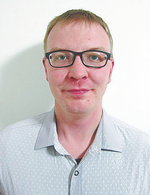Living like a nomad, builder and phoenix

I spent two months this summer in the wilderness of northern Michigan, living the answers to the question: What do you do when your life burns down — literally?
A fire reduced my parents' house to ashes a year ago. Confirming the universe's cruel sense of irony, the only thing to survive the flames was a stack of firewood.
After being stuck outside the United States for four years because of COVID-19, this July, I finally returned home … to homelessness.
I shared rustic conditions with my parents while helping them build a new house on new land near our old home. We'd always enjoyed camping rough, but this — this was different.
Since there was no place for me to stay on their lakefront property, I camped a few kilometers away in a tent without electricity, running water (unless you count a swampland stream) or even a latrine.
This isolated patch of wilderness had belonged to my grandparents, who'd passed away while I couldn't return Stateside. When my relatives graciously allowed me to acquire this land to keep it in the family, and to keep my grandparents' memories and legacies alive after their deaths, they'd never imagined it would soon host a work camp. Especially one where I'd stay to help my 68-year-old father, who's mostly building the house alone since my mother had her hip replaced.
Mom and Dad had spent the previous year crammed in an old camper. We raced as winter bit at our heels, especially since the trailer's floor was rotting out from beneath their feet.
I'd wake up in the woods and labor as a construction worker, homesteader and lumberjack until the sun disappeared, just before midnight.
Cooking, heating and lighting came from bonfires. Even summer nights are chilly there, so I slept in my (sometimes wet) jacket and shoes. Baths and laundry meant jumping into the lake with our clothes on. My clothes were so torn, stained and stinky that I burned many before I left.
Ice-packed coolers served in lieu of refrigeration. I came to accept a baseline of dirt and dead insects adding crunch to meals — our chance to bite the bugs back, I joked.
Six weeks in, a freak hailstorm shredded my tent, leaving me "extra homeless". Fortunately, we'd nearly finished building a toolshed in the woods where I could sleep.
It's an old — even ancient — way to live, in a seemingly prehistoric place.
We call the knoll where I pitched camp "Sunset Hill", since the evening horizon sighs with every shade of pastel the heavens can conjure. Once dusk smothers daylight's last gasps, constellations of fireflies burn just above the ground, but far below the meteor showers that spray sparks as they slice through the Milky Way's starry aerosol. Choirs of owls, coyotes, frogs and crickets chant lullabies as the leaves applaud in whistling breezes.
Sunrise peels waves of mist off the ripples of the lake, as if exorcising vaporous ghosts of the night. Bald eagles, hawks and herons project phantasmal reflections on the water as they soar above.
Deer play peekaboo in cedar bogs as they swish through uncoiling ferns. Rabbits prance like skipping stones, dancing across meadows flecked with flowers. Red-winged blackbirds clatter in cattails, while snapping turtles poke their snouts out of the lake like periscopes surrounded by white and yellow lilies that nod toward the banks.
One night, when my 11-year-old went to relieve herself in the woods, something growled at her in the darkness. Rather than running away, she inched closer to investigate.
The only dangerous mammals in the area are badgers and bears. I kept my rifle at camp to scare off any of these predators should they prowl too close, perhaps lured by our food.
Much of my life and career in China has centered around disasters. That is, especially my journalism and volunteer work in the quake zones in Wenchuan — where 90,000 people vanished in the rubble and tens of millions lost housing in 2008 — and Yushu, where I founded a poverty-alleviation initiative with nomadic yak herders on the seismically twitchy "roof of the world" in 2011.
This summer, I found myself on the other end of this equation on the other side of the Earth, living as a tent-dwelling nomad, homeless in my homeland, while helping my own family recover from a disaster that had destroyed their house.
A Tibetan family to whom I'd donated 1,000 yuan ($140) after a quake damaged their home in 2018, in turn, offered 100 yuan to my parents this summer.
Days before I had to leave, my mom and dad were finally able to sleep in their own room for the first time since the fire.
Soon after, I left my birthplace in Michigan's backwoods to catch a plane across the planet — more so, to another world — to my adoptive home in Beijing's concrete jungle.
I flew back to China, embodying the spirit of the phoenix. That, I found, is the answer to the question: What do you do when your life burns down?
You rise from the ashes. You fly high. You live anew.
Contact the writer at [email protected]





































